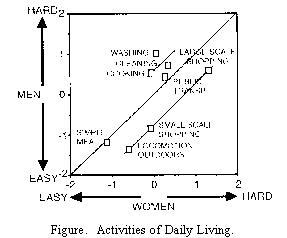
Major problems with the investigation of differential item functioning (DIF, item bias) are inexplicability and unreproducibility. Merely relying on statistical indicators to identify DIF leaves the analyst at the mercy of idiosyncratic samples of sub-groups. Experts, on the other hand, can discover something biased in every test item. Different experts can even assert that items are biased in different directions!
A combination of statistical, substantive and graphical techniques solves this problem. The Figure illustrates DIF in an "activities of daily living" (ADL) instrument. Looking at an single item, such as "Small-scale Shopping", we could come up with reasons why it is biased against both men and women! But plot all the item difficulties for men against those for women, and the general pattern is clear. Men find it harder to do chores around the house, "Washing", "Cleaning", "Cooking". Women find gross motor activities harder, "Locomotion Outdoors", "Small-scale shopping", "Large-scale shopping". Neutral items are "Simple meal" and "Public transport". Since the bias pattern indicated statistically has a clear substantive meaning that surmounts individual items, we can report the DIF as explicable and likely to be reproduced in continuing use of the instrument.

Gunnar Grimby
Grimby G., Andrén E., Daving Y., Wright B.D. (1998) Dependence and perceived difficulty in daily activities in stroke survivors. Stroke 29, 1843-1849.
Useful reporting of DIF.Grimby G. … Rasch Measurement Transactions, 1998, 12:3 p. 651.
| Forum | Rasch Measurement Forum to discuss any Rasch-related topic |
Go to Top of Page
Go to index of all Rasch Measurement Transactions
AERA members: Join the Rasch Measurement SIG and receive the printed version of RMT
Some back issues of RMT are available as bound volumes
Subscribe to Journal of Applied Measurement
Go to Institute for Objective Measurement Home Page. The Rasch Measurement SIG (AERA) thanks the Institute for Objective Measurement for inviting the publication of Rasch Measurement Transactions on the Institute's website, www.rasch.org.
| Coming Rasch-related Events | |
|---|---|
| Jan. 16 - Feb. 13, 2025, Fri.-Fri. | On-line workshop: Rasch Measurement - Core Topics (E. Smith, Winsteps), www.statistics.com |
| Apr. 8 - Apr. 11, 2026, Wed.-Sat. | National Council for Measurement in Education - Los Angeles, CA, ncme.org/events/2026-annual-meeting |
| Apr. 8 - Apr. 12, 2026, Wed.-Sun. | American Educational Research Association - Los Angeles, CA, www.aera.net/AERA2026 |
| May. 15 - June 12, 2026, Fri.-Fri. | On-line workshop: Rasch Measurement - Core Topics (E. Smith, Winsteps), www.statistics.com |
| June 19 - July 25, 2026, Fri.-Sat. | On-line workshop: Rasch Measurement - Further Topics (E. Smith, Winsteps), www.statistics.com |
The URL of this page is www.rasch.org/rmt/rmt123d.htm
Website: www.rasch.org/rmt/contents.htm